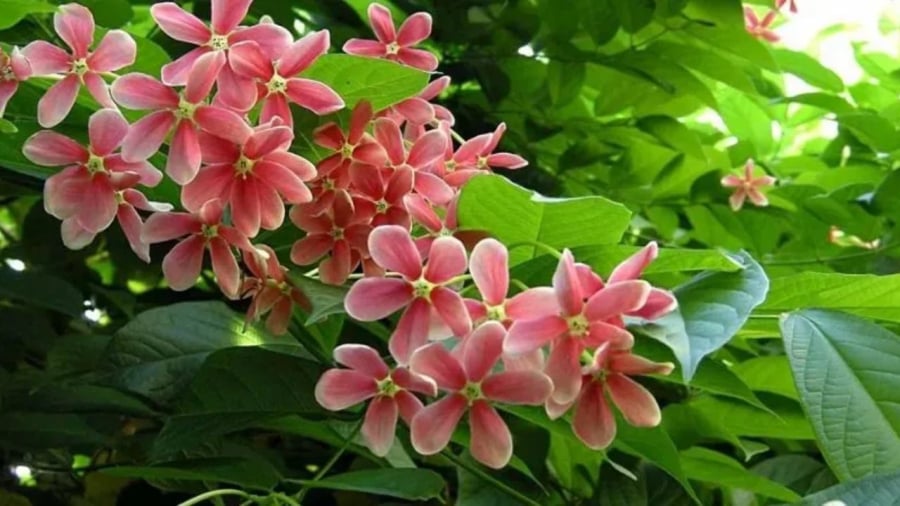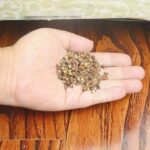The Duranta erecta, commonly known as Golden Dew Drop, is a versatile and fragrant flowering vine. In folk medicine, this plant is believed to have anti-parasitic properties, especially effective against intestinal worms, hence its moniker, “Scholar Vine” in Vietnamese.
There are two main varieties of Scholar Vine: the first features large, solitary five-petaled blooms, while the second, known as the Thai Scholar Vine, boasts double flowers with numerous, curled petals. The Thai variety’s flowers cluster tightly together due to their short stems, whereas the solitary variety presents a sparser appearance with its longer flower stalks. Both types, however, exhibit a delightful fragrance and typically display a mix of white, pink, and red hues on the same plant.
The Scholar Vine is a prolific bloomer, producing large, showy clusters of flowers. It can be trained to climb trellises or grown in pots with a supporting stake, making it a beautiful and low-maintenance addition to any garden or home.

Scholar Vine: A Fragrant and Aesthetic Wonder
Beyond its medicinal and ornamental value, the Scholar Vine holds significance in Vietnamese culture and feng shui. It symbolizes integrity, knowledge, and kindness, making it a favorable plant for those seeking to attract positive energy and prosperity. The vine’s resilience and ability to thrive in challenging conditions also represent courage and determination, reflecting the grower’s strength and perseverance.
The blooming of the Scholar Vine is considered a harbinger of good fortune, signaling a prosperous and thriving household. Its sweet fragrance is believed to induce relaxation and create a serene ambiance for homeowners.
From a feng shui perspective, the Scholar Vine brings Yang energy, fostering smooth endeavors, harmonious family relationships, and overall well-being. It is also associated with academic success and career advancement, making it a popular choice for those aspiring for scholastic achievements and professional accomplishments.
Why has the Scholar Vine landed on the “blacklist” for some gardeners?
Despite its beauty and symbolism, the Scholar Vine has earned a controversial reputation among some gardeners due to its aggressive growth habit. Scholar Vines can quickly spread and climb, requiring diligent maintenance to prevent them from becoming unruly. They are typically easy to propagate through stem cuttings, and their rapid growth makes them ideal for creating lush, flowering trellises.
However, the dense foliage of the Scholar Vine can attract insects and provide harborage for mosquitoes and snakes, which may be undesirable, especially for households with young children. Regular pruning is necessary to prevent overgrowth and maintain a healthy balance of light and airflow in your garden or living space.

Scholar Vine: Battling Pests and Leaves
During the summer months, Scholar Vines are particularly susceptible to infestations of black, red, and other varieties of ants. Gardeners need to be vigilant and employ appropriate pest control measures, such as spraying insecticides, to prevent these pests from becoming a nuisance. This is especially crucial for households with children, as the ants can cause discomfort and itching if they invade indoor spaces.
Additionally, the Scholar Vine tends to shed its leaves, requiring regular cleanup, especially when grown as a trellis. Homeowners with this vine should also be cautious of insects, mosquitoes, and ants, and take necessary precautions to keep them at bay, ensuring a pleasant and safe environment for their families.
Disclaimer: This information is for reference only and should not be solely relied upon for decision-making without further research or professional advice.
“The Secret to a Bountiful Star Apple Tree: Attracting Abundance with This Simple Trick”
Growing the carambola tree is a popular trend among many families nowadays. Not only does it serve as a decorative plant, but it also bears delicious and nutritious star-shaped fruits that can be enjoyed fresh or used in various culinary dishes and beverages. With its vibrant green foliage and unique fruit shape, the carambola tree makes an attractive addition to any garden or backyard, bringing both beauty and health to your home.




































